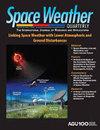Enhanced Radiation Levels at Aviation Altitudes and Their Relationship to Plasma Waves in the Inner Magnetosphere
IF 3.8
2区 地球科学
Q2 ASTRONOMY & ASTROPHYSICS
Space Weather-The International Journal of Research and Applications
Pub Date : 2023-10-01
DOI:10.1029/2023sw003477
引用次数: 0
Abstract
Abstract It is believed that galactic cosmic rays and solar energetic particles are the two major sources of ionizing radiation. However, the radiation source may also be due to relativistic electrons that are associated with precipitation from the Van Allen radiation belts. In this study, we use Automated Radiation Measurements for Aerospace Safety (ARMAS) measurements to investigate the precipitation mechanism of energetic radiation belt electrons. ARMAS instruments are flown on agency‐sponsored (NASA, National Oceanic and Atmospheric Administration, National Science Foundation, Federal Aviation Administration, DOE) flights, commercial space transportation companies and airliners (>9 km) in automated radiation collection mode. We identified magnetic conjunction events between ARMAS and NASA's Van Allen Probes to study the highly variable, dynamic mesoscale radiation events observed by ARMAS instruments at aviation altitudes and their relationship to various plasma waves in the inner magnetosphere measured by the Van Allen Probes. The results show that there is a strong correlation between dose rates observed by ARMAS and plasmaspheric hiss wave power measured by the Van Allen Probes, but no such relationship with electromagnetic ion cyclotron waves and only a modest correlation with whistler mode chorus waves. These results suggest that the space environment could have a potentially significant effect on passenger safety.航空高度的增强辐射水平及其与内磁层等离子体波的关系
银河系宇宙射线和太阳高能粒子被认为是电离辐射的两个主要来源。然而,辐射源也可能是由于与范艾伦辐射带的降水有关的相对论性电子。在这项研究中,我们使用航空航天安全自动辐射测量(ARMAS)测量来研究高能辐射带电子的沉淀机制。ARMAS仪器以自动辐射收集模式在各机构(NASA、国家海洋和大气管理局、国家科学基金会、联邦航空管理局、美国能源部)资助的航班、商业太空运输公司和飞机(>9公里)上飞行。我们确定了ARMAS和NASA范艾伦探测器之间的磁合事件,以研究ARMAS仪器在航空高度观测到的高度可变的动态中尺度辐射事件及其与范艾伦探测器测量的内磁层中各种等离子体波的关系。结果表明,ARMAS观测到的剂量率与范艾伦探测器测量到的等离子体嘶嘶波功率之间有很强的相关性,但与电磁离子回旋波没有这种相关性,与哨声模式合唱波只有适度的相关性。这些结果表明,空间环境可能对乘客安全产生潜在的重大影响。
本文章由计算机程序翻译,如有差异,请以英文原文为准。
求助全文
约1分钟内获得全文
求助全文
来源期刊
CiteScore
5.90
自引率
29.70%
发文量
166
审稿时长
>12 weeks
期刊介绍:
Space Weather: The International Journal of Research and Applications (SWE) is devoted to understanding and forecasting space weather. The scope of understanding and forecasting includes: origins, propagation and interactions of solar-produced processes within geospace; interactions in Earth’s space-atmosphere interface region produced by disturbances from above and below; influences of cosmic rays on humans, hardware, and signals; and comparisons of these types of interactions and influences with the atmospheres of neighboring planets and Earth’s moon. Manuscripts should emphasize impacts on technical systems including telecommunications, transportation, electric power, satellite navigation, avionics/spacecraft design and operations, human spaceflight, and other systems. Manuscripts that describe models or space environment climatology should clearly state how the results can be applied.

 求助内容:
求助内容: 应助结果提醒方式:
应助结果提醒方式:


